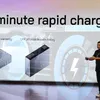Tata Plans UK Battery Factory for Land Rover and Jaguar EVs
Tata Sons is venturing into a £4 billion UK battery plant, tapping startups for technological prowess, aiming to shape Europe's electric vehicle future
In a strategic move towards solidifying the future of electric vehicles (EVs), Tata Sons is aggressively charting its course to establish a groundbreaking battery plant in the UK. This endeavor, projected at a substantial investment of £4 billion ($5.1 billion), not only emphasises Tata's commitment to sustainable transportation but also the evolving landscape of the global automotive industry.
The company's forward-looking vision doesn't stop at mere establishment. Recognising the rapidly changing technological landscape, Tata is actively engaging with various startups, renowned for their cutting-edge innovations in the EV sector. As Tata Motors Group CFO, P.B. Balaji, stated in a recent conversation, these startups are the technological vanguards, and the potential to integrate their insights into Tata's operations presents a vast sea of opportunities.
With an anticipated production capacity sufficient to cater to half a million vehicles annually, the forthcoming battery plant is poised to be a game-changer. Tata's approach to this massive project is holistic. Rather than simply focusing on production, the conglomerate seeks to nurture partnerships that span the entire spectrum – from cell chemistry, manufacturing nuances, to the broader aspects of industrialisation.
The collaborative dynamics envisaged by Tata are multifaceted. They range from conventional joint ventures and knowledge-sharing paradigms to more experimental and licensing frameworks. Such a comprehensive strategy underscores Tata's intent to lead, learn, and leverage in equal measure.
But what's truly commendable about Tata's vision is its inclusivity. The company isn't merely looking at manufacturing partnerships; it's keen on roping in pioneers from R&D, innovation, and refining sectors. This inclusive strategy, aiming to cover various stages of the value chain, resonates with Tata's promise of quality and innovation.
While Tata's initiative is laudable, it's worth noting that they aren't alone in this race to revolutionise Europe's battery supply for EVs. Prominent carmakers, such as Mercedes-Benz Group Ag, Stellantis NV, and Nissan Motor Co., have already made strides in this direction. Most have opted to collaborate with established battery producers to enhance Europe's battery ecosystem. For instance, Volkswagen AG, despite its ambitious plans for a 240-gigawatt hour capacity, faces hurdles ranging from talent acquisition to sourcing essential minerals.
Tata's foray into the battery production space represents more than a business decision. It's a reflection of a shifting industry paradigm, a promise of sustainable transportation, and a testament to the synergistic power of collaborations. As we await further details on Tata's choice of partners, the automotive world looks set for exciting, electric times ahead.








